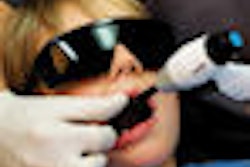Diode-laser energy appears to inhibit root dentin demineralization without causing harmful thermal effects, according to a new study in Lasers in Medical Science (November 20, 2010).
Researchers from Federal University of Ceará in Brazil evaluated the effects of a low-intensity diode laser (808 nm) on dentinal chemical composition and prevention of demineralization. They also monitored intrapulpal temperature changes during the course of irradiation.
Forty dentin specimens were randomly allocated into four groups (n = 10):
- G1: no treatment (control)
- G2: irradiated with 15 J/cm²
- G3: irradiated with 30 J/cm²
- G4: irradiated with 60 J/cm²
Each specimen was partially covered with nail varnish, treated according to the group irradiation levels, and exposed to 1.0 M of hydrochloric acid for five minutes. Dentin loss was then analyzed using scanning electron microscopy combined with energy dispersive x-ray.
For all irradiated groups, intrapulpal temperature changes were less than 3° C (37.4° F). The G2 group showed statistically significant differences when compared to the other groups, representing the lowest temperature increase. The G4 group statistically differed from all other groups representing the lowest wear rate.
While the exact mechanism of the action of the laser remains unclear, "These results suggest that dentin irradiation, using a diode laser with levels set at 60 J/cm², may induce inhibitory effects on root dentin demineralization without causing any harmful thermal effects," the researchers concluded.
Copyright © 2010 DrBicuspid.com



















